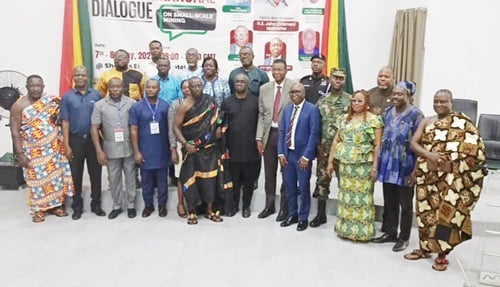The alarming state of illegal mining, locally known as “galamsey,” in Ghana is devastating the nation’s forest reserves and water bodies, posing a significant threat to ecosystems and communities. According to Lands and Natural Resources Minister Emmanuel Armah-Kofi Buah, 44 out of 288 forest reserves have suffered degradation, with over 5,252 hectares lost directly to this illicit activity. The turbidity levels of rivers, a critical indicator of water quality, have soared to over 5,000 Nephelometric Turbidity Units (NTU), drastically exceeding the acceptable limit of 500 NTU. This alarming pollution is compounded by the presence of toxic chemicals like mercury and cyanide, further endangering both the environment and human health. The government has recognized the severity of the situation and initiated efforts to combat galamsey, but acknowledges that a multifaceted approach involving all stakeholders is crucial for success.
The fight against galamsey requires a collaborative effort, extending beyond governmental action. While the government has confiscated equipment, including 150 excavators and five bulldozers, and arrested 71 individuals involved in illegal mining, Minister Buah stresses the need for collective responsibility. Communities, industries, traditional leaders, environmental advocates, and all stakeholders must unite to address this complex issue. The data paints a grim picture, revealing the extent of the problem and highlighting the urgent need for decisive action. The government’s efforts, while commendable, are insufficient to eradicate galamsey without broader societal engagement. The fight against illegal mining demands a comprehensive strategy that encompasses legal enforcement, community involvement, and addressing the underlying socio-economic factors driving this destructive practice.
Several factors contribute to the persistence of galamsey despite previous interventions. These include weak political will, inconsistent enforcement of existing regulations, and complicity at various levels of governance. Security gaps, inadequate geological data, delays in prosecution, and the infiltration of foreign actors further complicate the issue. Greed and the involvement of some politicians, traditional leaders, and citizens also exacerbate the problem. The use of armed gangs by illegal miners to intimidate and resist enforcement efforts adds another layer of complexity. Finally, the unregulated importation of equipment such as excavators facilitates the illegal operations. Addressing these multifaceted challenges requires a comprehensive approach that tackles both the immediate operational issues and the underlying systemic weaknesses.
Minister Buah emphasizes that eradicating galamsey demands a systemic change, moving beyond merely enacting new laws. Strong political will, collective action, and a fundamental shift in mindset are crucial for achieving lasting results. The current government has expressed its commitment to eliminating this destructive practice and has called for a concerted effort to achieve this goal. Strengthening legal frameworks to ensure robust enforcement within communities, providing alternative economic opportunities, and promoting transparent governance to uphold ethical standards across the mining sector are key components of this strategy. The success of these efforts hinges on the collective commitment of all stakeholders to address the root causes of galamsey and transition towards sustainable and responsible mining practices.
The government has outlined specific strategies to revitalize the mining sector and steer it towards a more sustainable and responsible path. These include reforming the licensing regime by issuing new licenses at the district level with the involvement of traditional authorities and the Environmental Protection Agency (EPA). This localized approach aims to enhance transparency and accountability in the licensing process. Recognizing past irregularities, the government has revoked all post-December 2024 licenses. The Community Mining Scheme has been replaced with a Cooperative Mining Scheme, aiming to promote more structured and responsible mining practices within communities. These reforms underscore the government’s commitment to overhaul the mining sector and address the challenges posed by galamsey.
Technological advancements are also being employed in the fight against illegal mining. Excavators are now geo-tagged and monitored around the clock, allowing for real-time tracking of their movements. Non-compliance with regulations can trigger remote immobilization, effectively shutting down illegal operations. All excavators imported into the country will be registered and tracked, while those already in operation will also be brought into the registration system. This heightened level of monitoring aims to deter illegal activities and enhance the enforcement capacity of the authorities. Furthermore, a more robust joint task force comprising the military, police, and the Forestry Commission has been deployed to actively combat illegal mining operations and bring perpetrators to justice. Public participation is also encouraged, urging citizens to report any suspicious activities to aid in the eradication of galamsey. The government’s strategy combines technological advancements, enhanced enforcement, and community involvement to create a more effective and sustainable approach to combating illegal mining.


